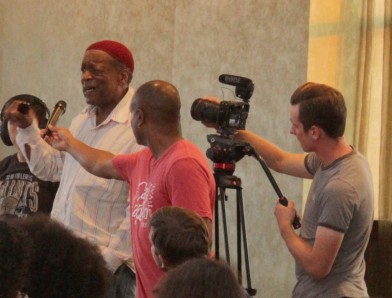A packed, rapt and way-too-white audience overflowed the chairs set up on the fourth floor of Basin Street Station Monday evening “for a conversation before the circus comes to town,” as moderator and jazz journalist Larry Blumenfeld summarized it.
The panel was a production of a group calling itself the “Crescent City Cultural Continuity Conservancy” (or “C5”) to address the state of music and culture in New Orleans at the ballyhooed 10-year post-Katrina mark. The poignant, often emotional remarks of community voices on the panel (and in the audience) revealed a city not cured of its ills by the waving of Mayor Mitch Landrieu’s magic wand—the official talking points of resilience and renewal for this week’s return performance on the global stage—but rather a city that still hasn’t healed from the devastation of flood waters a decade ago, much less damage done by systemic cultural oppression due the city’s four-centuries-old original sin of slavery.
“Hell no!” Tamara Jackson, president of Social Aid and Pleasure Club (SAPC) Task Force, replied after Blumenfeld asked if relations between city officials and the second-line community were better now as opposed to 2007, when skewed enforcement of a new permitting process (and its 300-percent increase in fees) surfaced in the wake of a shooting at a Sunday second line. Jackson, who has three times successfully sued the City of New Orleans on behalf of second-line interests, helped organize the “all wards” second line, the city’s first since Katina, and one which drew busloads of natives back from Houston for the first time since the storm. She was told after three NOPD officers served her a summons the following Monday that second lines “were bringing back a criminal element that had gone” from the city after Katrina.
Describing these new rigid policies of permits and police escorts imposed on the city’s backstreet culture as a misguided notion of “imposing order on a formerly disorderly place,” noted native writer Lolis Eric Elie delivered the night’s first applause when he stated the primary flaw in post-Katrina plans as being “not contingent on black citizens.”
Elie further noted the city today is shy 80,000 black residents of its pre-Katrina number (though estimates put the city as having gained 10,000-plus white residents). While such numbers—accounting for displacement and return—of the city’s cultural community still remain elusive, Sweet Home New Orleans, a non-profit headed originally by writer/activist Jordan Hirsch said that SHNO successfully tracked this population until the organization’s demise in 2010. Hirsch’s group worked to provide resources for local musicians and culture bearers to return home after Katrina, and noted the agency paid for the first 174 out of 178 SAPC permit fees following the 2007 hike and that “this community came back faster and with a higher rate of return, despite lower income levels and less access to assistance, to reconstitute its community faster than the local population with more privilege.”
The city’s rampant gentrification, one of many 400-pound gorillas in the room, reared its ugly head next as composer, clarinetist and culture critic Evan Christopher, describing musicians as “half coming back hat in hand to a city where jazz is an empty slogan hung from street signs,” said inflated rent prices have made working musicians in inner-city neighborhoods “an endangered species” in an economic environment “exploitative of our indigenous, organic cultural activities.”
Fred Johnson, founding Black Men of Labor member, former Yellow Pocahontas Spy Boy and director of the Neighborhood Development Foundation, shared a story of a trip to Africa in which he observed traditional forms of fabric weaving, and learned that “the poorest people make the richest things.” Johnson shifted the night’s focus towards a more solution-based discussion with a theme of self-reliance and self-determination within a democracy. “We’ve got to be better stewards of our culture and it’s our fault if we don’t examine who we elect,” Johnson stated before drawing big applause with: “The same politicians now saying they don’t want the second line outside their front door, when they have a party, take a guess who’s playing outside their front door?”
Steering a discussion that easily (and perhaps deservedly) could have slipped into over-wrought rancor, Blumenfeld asked Bennie Pete, sousaphonist and Hot 8 Brass Band founding member, if post-Katrina New Orleans “is a place for you, a place for people like the guys in the Hot 8?” “Yeah it’s for us,” Pete answered, “because it’s ours. From the elders all the way down to the children that make our community, we created it—it’s in our blood.”
Chief Howard Miller, President of the New Orleans Mardi Gras Indian Council, said “The culture must be allowed to continue–free range, because everything comes from the Mardi Gras Indian culture. He stressed the importance of educating youngsters in the traditions.
At this point, Jerome Smith, veteran of the city’s Civil Rights movement in the 1960s and long-time face of the Treme Community Center, interjected from the audience to deliver statements echoing Johnson and Pete’s self-reliant stance. “I didn’t use his dictionary—I used my dictionary,” Smith said while describing his famed meeting on behalf of Southern black families at a New York City hotel with then-Attorney General Robert F. Kennedy, who presumed his role as beloved liberal white Yankee only to be rebuffed in Smith’s stern, commanding vocal prowess.
“The only solution here is to support the humanity of black people,” Smith stated before inspiring applause and few shouts with: “There’s a simplicity in this solution, too, something as simple as saying, ‘Good morning’ or ‘Good evening’— that’s the sound of our city.”





